Suivi et évaluation
La plupart des défis liés au suivi et à l’évaluation, comme la quantité insuffisante d’investissements et le manque de capacités, ne sont pas spécifiques à l’assistance monétaire, mais ceux qui le sont concernent principalement le suivi des résultats des transferts non affectés. La flexibilité des transferts monétaires peut compliquer la définition d’indicateurs de résultats appropriés, qui pourraient impliquer un mélange d’indicateurs spécifiques au secteur et transversaux. En parallèle, il existe des limitations au moment de collecter des données précises sur la manière dont les transferts monétaires sont dépensés.
Les signataires du Grand Bargain se sont engagés à garantir que des mécanismes de suivi et d’évaluation pertinents des transferts monétaires soient en place, et à assurer une meilleure compréhension des coûts, avantages, impacts et risques de cette modalité par rapport à d’autres. En partant de cet engagement, le chantier du Grand Bargain sur les transferts monétaires a établi plusieurs points d’action, dont le développement d’indicateurs de résultats communs pour les transferts monétaires à usages multiples, et des indicateurs pour l’analyse de l’optimisation des ressources. L’analyse systématique de l’optimisation des ressources a été rendue difficile par plusieurs facteurs, dont un manque d’approches approuvées, le besoin en données sur les résultats en termes de qualité et le caractère intensif de l’analyse.
Priorités actuelles
Dans le cadre des engagements du chantier du Grand Bargain sur les transferts monétaires, le CALP Network a co-dirigé (avec l’USAID et CRS) la mise au point d’indicateurs de résultats des transferts monétaires à usages multiples. Le projet à tester est actuellement disponible en anglais, espagnol et français, via la bibliothèque.
Initiatives associées
Contenu présenté

Indicateurs de résultats des transferts monétaires à usages multiples : Projet final à tester
Guides et outils
Les indicateurs présentés dans ce document se concentrent sur les principaux objectifs des TMUM humanitaires et sur les résultats auxquels les transferts monétaires à usages multiples peuvent le plus fortement contribuer. (Par exemple, certaines interventions en TMUM visent à relier les personnes aux systèmes de protection sociale après la fin du TMUM; mais nous n’avons pas inclus...

Monitoring 4 CTP: Monitoring Guidance for CTP in Emergencies
Guidelines and Tools
This guidance provides a central resource to promote a common understanding of the most important monitoring considerations for humanitarian projects using cash transfer programming (CTP). The primary audience for this guidance is field-level practitioners, from organisations directly involved in the design, implementation, monitoring, and accountability of projects using cash and vouchers...

Cost-Efficiency Analysis of Basic Needs Programs: Best Practice Guidance for Humanitarian Agencies
Guidelines and Tools
The Efficiency, Effectiveness and Value for Money Sub-Workstream is pleased to share the final output on Cost-Efficiency Analysis of Basic Needs Programs: Best Practice Guidance for Humanitarian Agencies (attached).
Cost-efficiency analysis estimates the ratio of program costs to outputs created, allowing you to compare cost-per-output for programs which all produced the same output. Such...
Thematic lead
Contenu récent

Colombia and Lebanon Evaluation Report: Measuring the impact of cash on child protection outcomes
Report
As humanitarian crises break down traditional protection mechanisms and the loss of income restricts access to basic resources, children become increasingly vulnerable to abuse, neglect, exploitation, and violence. Cash and Voucher Assistance (CVA) is a critical modality that is increasingly being adopted...

Cash & Voucher Assistance (CVA) & Child Protection (CP) Global Study – Research Report in the DRC, Egypt, Lithuania and the Philippines
Report
Since 2022, Save the Children has been scaling up its use of CVA for Child Protection (CP) programming through various pilot projects.
Research was commissioned in four countries in 2022-23 to generate evidence and learning to inform the design of future programming but also to design a robust...
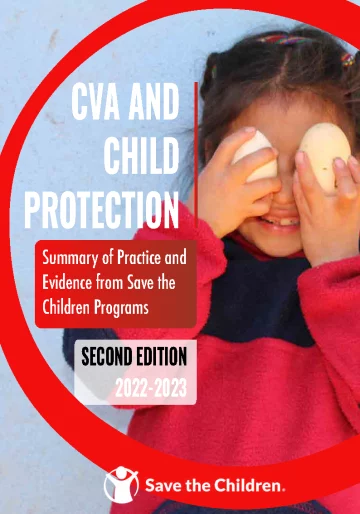
Cash and Vouchers Assistance (CVA) and Child Protection: Summary of practice and evidence from Save the Children programmes 2023 Edition
Report
In an effort to increase global knowledge and learning, Save the Children conducted a global review of twenty Country Offices and their programs in order to assess and highlight the impact that different forms of Cash and Vouchers Assistance (CVA) have on Child Protection (CP) outcomes, to identify...
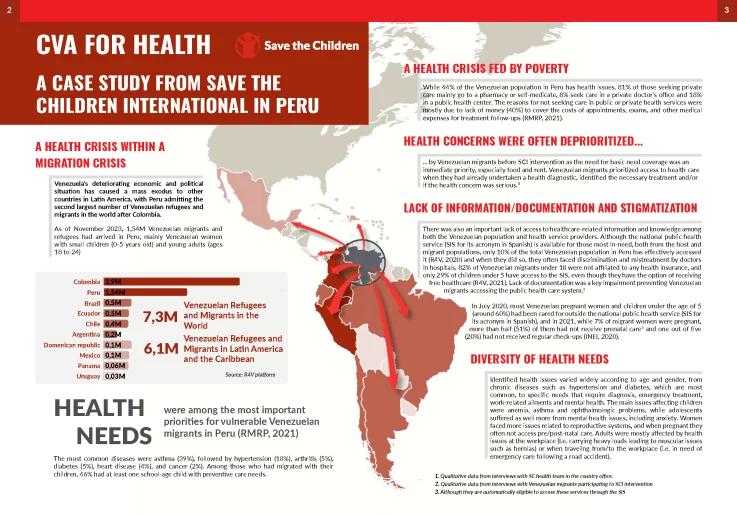
Cash & Voucher Assistance (CVA) for Health Outcomes: a case study in Peru
Case Study
This case study is drawn from Save the Children CVA operations in Peru between 2021 and 2023, focusing on the achievement of health outcomes for vulnerable Venezuelan migrants.
Following an overview of the contexts and of the needs, it deep dives into the technical design of the integrated program,...

Will our Opinion Matter? Community consultations on the design of multi-purpose cash programmes in Lebanon
Report
Since late 2019, Lebanon has been grappling with a severe economic and financial crisis. The Lebanese lira has lost more than 98 percent of its value, and over half of the Lebanese population is estimated to be living in poverty. The Government of Lebanon and development and humanitarian agencies have...
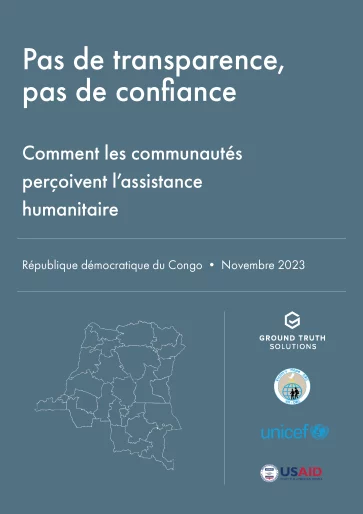
Pas de transparence, pas de confiance : comment les communautés perçoivent l’assistance humanitaire
Rapport
Réputée pour sa culture dynamique, sa diversité linguistique et ses importantes ressources naturelles, la République démocratique du Congo (RDC) fait honneur à son surnom de « cœur de l’Afrique ». Pourtant, malgré sa richesse culturelle et ses avantages géostratégiques, le pays détient...

WVI Cash Roadmap 2.0 – New Avenues – Leveraging, multiplying “Nexus” cash to take children and their families further than imagined
Policy paper
WVI's strategic global Cash Roadmap 2.0 (2024-2027) speaks to the organisations' commitment that amidst polycrises and resourcing constraints, there is urgency to maximise and multiply World Vision's capabilities, assets and cash voucher programming (CVP=CVA) is a powerful tool to do so.
Increasing...
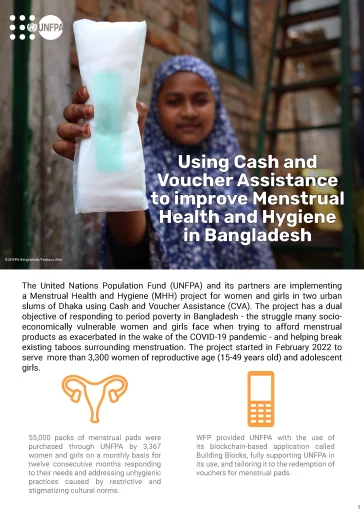
Using Cash and Voucher Assistance to improve Menstrual Health and Hygiene in Bangladesh
Case Study
The United Nations Population Fund (UNFPA) and its partners are implementing a Menstrual Health and Hygiene (MHH) project for women and girls in two urban slums of Dhaka using Cash and Voucher Assistance (CVA). The project has a dual objective of responding to period poverty in Bangladesh – the struggle...

CWG Learning Workshop: Report – Consolidate Knowledge
Report
On June 8th, the United Nations hosted a Learning Workshop on cash-based programmes in Sri Lanka. Led by the Cash Working Group (CWG) and supported by the Office of the UN Resident Coordinator (RCO), the workshop served as a platform for consolidating knowledge for cash-based interventions amid the...
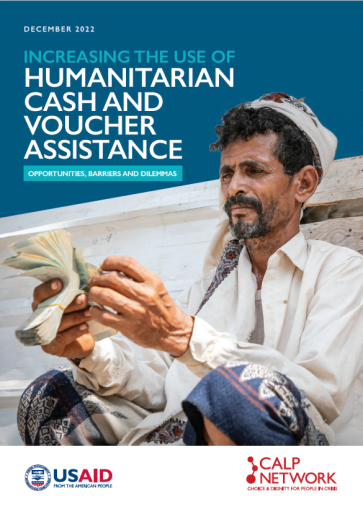
Increasing the Use of Humanitarian Cash and Voucher Assistance: Opportunities, Barriers and Dilemmas
Report
Through in-depth analysis of the latest data and careful modelling this study maps the current scale of CVA, and unpacks the opportunities and challenges involved towards it fully reaching its potential.
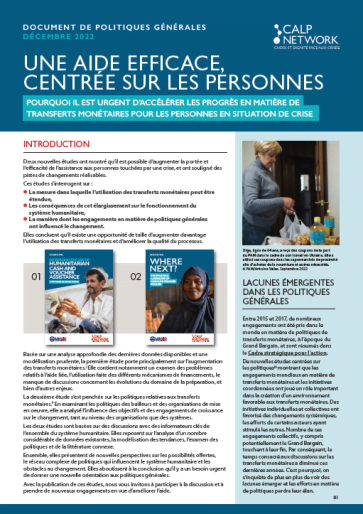
Une aide efficace, centrée sur les personnes : pourquoi il est urgent d’accélérer les progrès en matière de transferts monétaires pour les personnes en situation de crise
Guides et outils
Ce document de politiques générales, qui présente des arguments clairs en faveur de l'action, expose les dernières données probantes et informations sur la manière dont les transferts monétaires sont utilisés, et indique s'ils atteignent leur potentiel en matière de soutien aux personnes en...
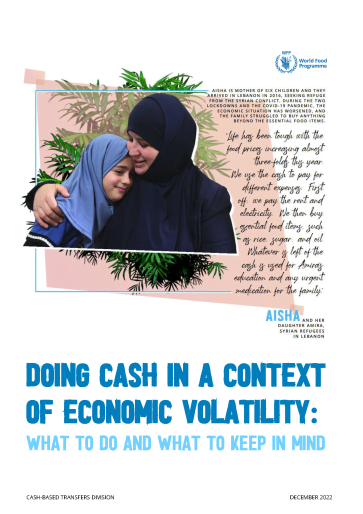
Doing Cash in a context of economic volatility: What to do and what to keep in mind
Guidelines and Tools
This interim WFP guidance was issued in 2022 to provide support to cash operations in contexts of economic volatility, be it when there is inflation, depreciation or currency volatility, parallel exchange rates, liquidity issues and changes in financial regulation, among others.

Écouter ne suffit pas: Les communautés demandent une refonte de l’assistance humanitaire
Rapport
« Notre performance se mesure avant tout à la manière dont les communautés vivent et perçoivent notre travail ». C’est à la suite de cette déclaration des membres du Comité permanent interorganisations (Inter-Agency Standing Committee, IASC) sur la redevabilité des humanitaires envers les...

Independent evaluation of CAMEALEON
Report
CAMEALEON is an independent initiative to provide monitoring, evaluation, accountability and learning support to the World Food Programme (WFP)’s multi-purpose cash (MPC) programme for Syrian refugees in Lebanon. Established in 2017, CAMEALEON’s main purpose is to bridge evidence gaps, strengthen...
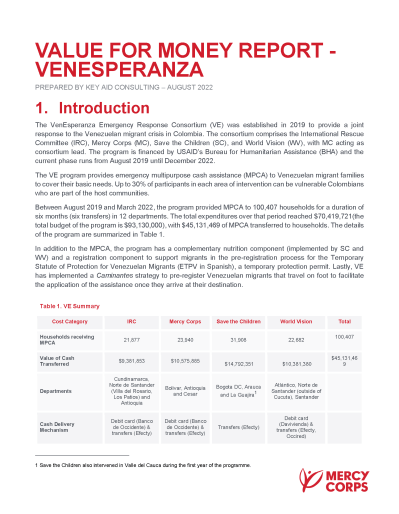
Value for Money Analysis of VenEsperanza
Case Study
The VenEsperanza consortium in Colombia participated in a Value for Money analysis that evaluated financial transactions during the first years of operation of the consortium. The analysis focuses on efficiency, effectiveness and equity of the work of the consortium.
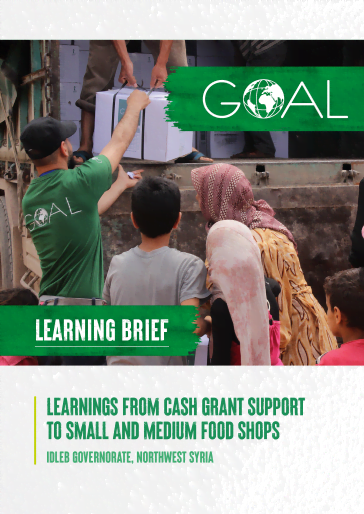
Learnings from Cash Grant Support to Small and Medium Food Shops in Northwest Syria
Report
The majority of vendors working within GOAL’s areas of operation survive on slim margins and are highly susceptible to market and currency instability, often resulting in an inability to restock on time due to a lack of financial capital. Vendors are often confronted with other issues such as the lack...
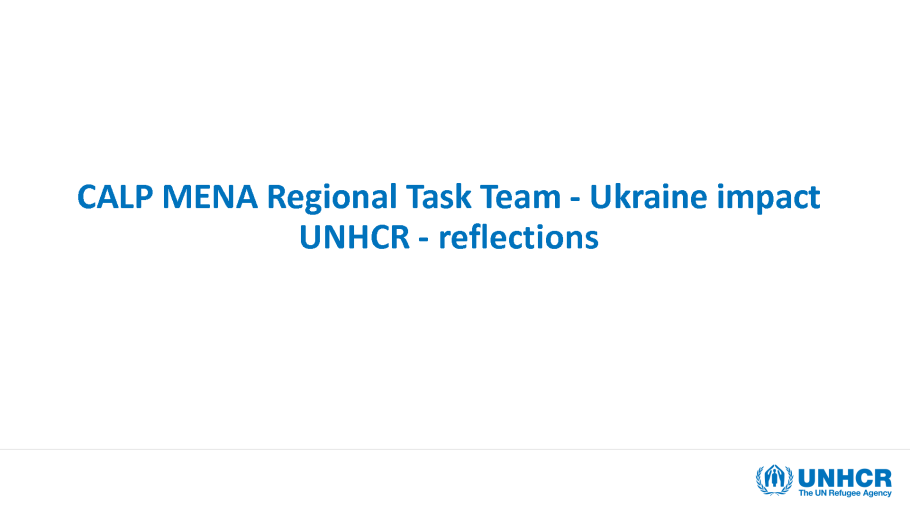
UNHCR Reflections on the Ukraine Effect for the MENA Regional Task Force
Presentation
A presentation shared by UNHCR colleagues on their reflections on managing CVA in contexts of high inflation.
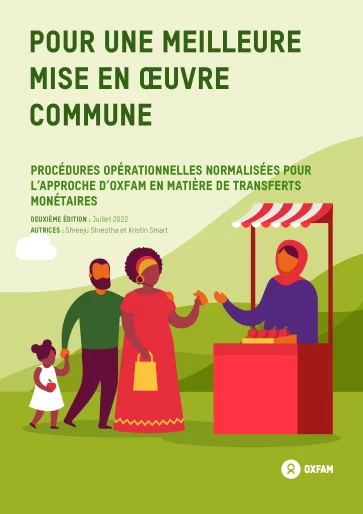
Pour une meilleure mise en œuvre commune : Procédures opérationnelles normalisées pour l’approche d’Oxfam en matière de transferts monétaires
Guides et outils
Pour une meilleure mise en œuvre commune: Procédures opérationnelles normalisées pour l’approche d’oxfam en matière de transferts monétaires est un guide numérique sur tout ce qui concerne les transferts monétaires à Oxfam. Il peut être téléchargé et consulté sur un téléphone, une...
Global Cash Working Group Meeting – 29 March 2022
Presentation
This slide deck includes presentation materials from the GCWG meeting on 29 March 2022. Presentations include an overview of the cash coordination caucus outcomes by NRC and an update on research by Ground Truth Solutions.

DG ECHO Thematic Policy Document on Cash Transfers
Policy paper
DG ECHO released its Thematic Policy document on Cash Transfers in March 2022. The document provides guidance primarily to DG ECHO’s partners and staff, but also to the wider cash community with the objective of collectively enhancing the quality and efficiency of cash programmes and of humanitarian...



